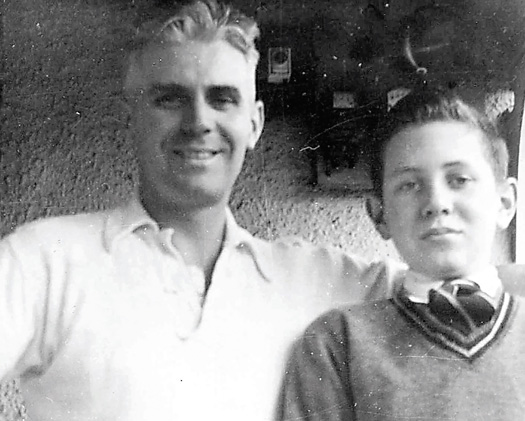17 October 2019

Michael Kirby with his father Donald.
When he retired from the High Court of Australia in 2009, The Hon. Michael Kirby AC CMG was Australia's longest-serving judge. Longevity is important to Justice Kirby, who has continued to serve with great vigour in retirement.
His father, Donald, lived until he was 96 – and according to Kirby he should have lived longer. At the age of 95, Donald had just renewed his driver's licence when he was diagnosed with prostate cancer.
"Several times my father told me, 'I have overcome many scrapes in my life, and I will beat this one', but he did not," Kirby reflects.
Every year, 1.3 million men worldwide are diagnosed with prostate cancer. Notably, Australia has one of the highest incidence rates internationally, with one in every seven Australian men likely to be diagnosed during their lifetime.
Kirby says the disease left his father depressed and angry – he had been independent and active in retirement and had enjoyed a life rich with family and friends.
"My father lived until he was nearly 96 and many people said he had enjoyed 'a good innings'. However, when he died, this phrase irritated me because he had not wanted to die, was still generally healthy, and above all had all his marbles," Kirby says.
The Prostate Cancer Foundation of Australia (PCFA) is committed to improving outcomes for men like Donald Kirby, and those like Michael Kirby with a family risk of the disease.
CEO of Prostate Cancer Foundation Professor Jeff Dunn AO says an estimated 20,000 Australian men will be diagnosed with the disease this year.
"While survival rates for prostate cancer are high, with over 95 per cent of men likely to survive at least five years, the diagnosis of prostate cancer is a major life stress that is often followed by challenging treatment-related symptoms and heightened distress," he says.
"We have made great progress in saving lives and helping more men survive prostate cancer – delivering ground-breaking new treatments, next generation medicines, and clinically advanced options for surgery and disease management.
"While our achievements have been tremendous, we have more work to do, particularly in providing men and their families with much greater psychosocial support and care after their diagnosis and treatment for prostate cancer.
"We face vast challenges in defeating prostate cancer and meeting the needs of those affected – a gift of just $100 helps to ensure that men know their options and can call on us for support.
"It's vitally important that we support men to access world-leading advice, clinical care, and support."
PCFA will be raising awareness of the disease throughout September for national Prostate Cancer Awareness Month.
"Men over 50 – or over 40 if they have a family history of prostate cancer – should talk to their GP about their prostate health," says Dunn.
"In the early stages, there may be no symptoms, which is why it's vital for men to understand their risks and their options."
For those who talk to their GP and decide to screen for prostate cancer, a simple blood test is offered. The test measures Prostate Specific Antigens in the blood and is known as a PSA test.
The days of digital rectal examinations are long gone, and the test itself is an example of how community donations have contributed to game-changing screening protocols that have transformed how we approach early detection and management of the disease.
There are more than 200,000 Australian men alive today after a prostate cancer diagnosis and about 3,500 Australian men will die of the disease each year.
PCFA is calling on lawyers and legal professionals to get involved by making a donation during Prostate Cancer Awareness Month.
Please visit here to make a donation.
If you or a loved one has been affected, please contact PCFA today for the latest information, expert advice, referrals, support, and connection to others who have been through the experience.
